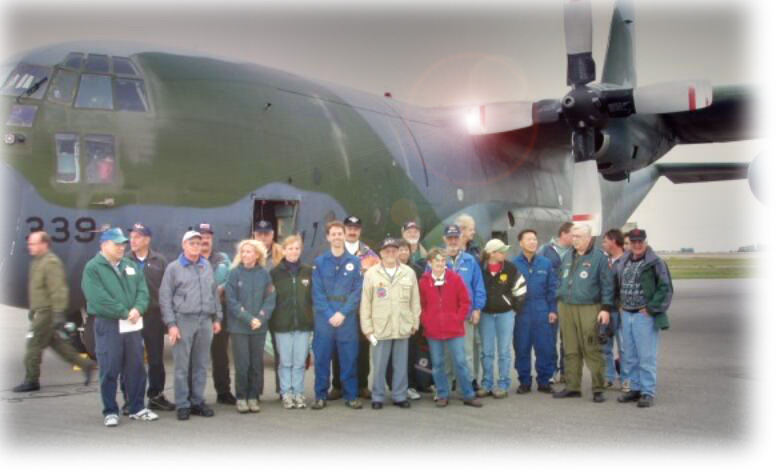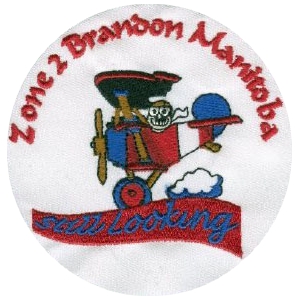|






| |
Welcome to Zone 2

C-130 Hercules from 435 Squadron, Winnipeg with Captain
Rod Lanning (rtd.) (former CASARA Liaison and Canada's highest time Hercules Pilot) at Zone 2's Evaluation
Day; the Official "Still Looking" Crest of Zone 2 designed by D. Childerhose
Introduction
I dedicate this page to those who serve
"that others may live", specifically, my fellow volunteers--spotters,
navigators, pilots and ground crew--who fly out
of Zone 2, CASARA Manitoba (CASARAMAN).
Where We Are
Zone 2 flies largely out of Brandon (CYBR) and
surrounding airports. Our area extends from the US/Canadian Border north to The
Pas Zone 3, west to the Saskatchewan border, and east to Portage la
Prairie. Manitoba Zones include Zone 3 - The Pas, Zone 1 - Winnipeg and Zone 5 the Province. All participate and share
resources with each other depending on the search tasking. Our Zones also
participate with other CASARA units in various Search and Rescue Exercises (SAREX's)
and searches.
A current goal is to expand internationally with our American counterparts, the
Civil Air Patrol (CAP), which began with Canadian participation in 2004 at Minot's USAF
Base's Northern Neighbor's Day.
Who We Are
 Civil Air Search and Rescue Association fly simulated and actual search
operations often with the coordination of military and police operations. CASARA
stretches across all of Canada and is funded by the federal government largely
through the Military with some participation by Transport Canada. Its largely
air component is supplemented with its own ground search and other Ground Search
and Rescue units that include the Office of the Fire Commissioner, the Rangers and the
Royal Canadian Mounted Police (RCMP). The
Association is complete with experienced veterans and very interesting
characters from all walks of life who put exemplary dedication into saving life,
often through the night and in isolated sparsely settled and uninhabited areas. Civil Air Search and Rescue Association fly simulated and actual search
operations often with the coordination of military and police operations. CASARA
stretches across all of Canada and is funded by the federal government largely
through the Military with some participation by Transport Canada. Its largely
air component is supplemented with its own ground search and other Ground Search
and Rescue units that include the Office of the Fire Commissioner, the Rangers and the
Royal Canadian Mounted Police (RCMP). The
Association is complete with experienced veterans and very interesting
characters from all walks of life who put exemplary dedication into saving life,
often through the night and in isolated sparsely settled and uninhabited areas.
How We Do It
In a typical actual search, JRCC
(Joint Rescue Coordination Centre) out of Trenton, Ontario (8 Wing Canadian Military) receives a
request from a public safety agency or "hit" by an ELT (Emergency Locator
Transmitter) located by its satellite monitoring systems. JRCC then relays a request protocol to a CASARA Zone.
The CASARA team will then setup a base headquarters operation with communications and
designate aircraft and spotter/navigator/pilot crews. A selected search pattern
and tasking will then be issued by the Search Commander which may include a
Creeping Line Ahead, Track Crawl, Expanding Square, Sector, Shore Crawl and/or Contour Search.
The latest in equipment is used, including search software such as Ozi-Explorer,
Flight Wizard, GPS tracking and computer upload evaluation and ELT homing devices such as the L'il
Helper. Other search techniques such as the aural null may be implemented.
Missions often include simultaneous operations with various aircraft,
helicopter, CC-130 Hercules and ground teams. Dependent on area and mission,
CASARA volunteers may serve as aircrew on military aircraft such as on the
CC-130 Hercules, the
CC-115 Buffalo, the CC-149 Comorant and the CC-146 Griffon helicopters.
Other searches may involve taskings directly from local agencies such as the
Royal Canadian Mounted Police. The RCMP may request CASARA air and ground assets
for searches for overdue and missing persons often over land and over water. On
the request of the RCMP, some RCMP members may fly onboard CASARA aircraft,
while CASARA volunteers may fly on RCMP aircraft such as on the Bell Long-Ranger
IV and the Pilatus PC-12 working as certified FLIR (Forward Looking Infrared)
operators and as spotters.
Regular training involves work in spotting, navigating,
piloting, ground search and ground operations. Every two years, each Zone is
tested and evaluated by the Military. All members have a CC-130 Hercules training
option while some act on reserve with training by the
Royal Canadian Mounted
Police (RCMP) on their Bell Long-Ranger IV helicopter using the latest in Nite-Sun
and FLIR (Forward Looking Infra-red) equipment. Other specialized training
options include the highest-level search and rescue course in the Canadian
military, the SearchMaster 0901
course.
|
